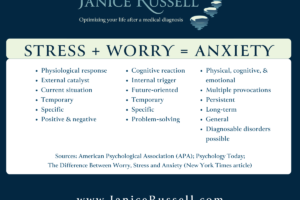
Here’s a Simple Way to Avoid One Frustration
There are many things about a medical condition that may frustrate you, so let me get a little more specific.😊
When you can research symptoms and conditions in so many different ways, it’s easy to go down a rabbit hole in which you get accurate, yet incomplete information.
Here’s an example from a recent conversation in an online support group for women with mental health challenges.
Original post (with changes for privacy and readability). This may or may not be directly related to anxiety, but I know it’s related to my negative mental health effects. I don’t like to self-diagnose, but I have done a lot of research and online tests, and I am very sure I have Pathological Demand Avoidance (PDA).
My current therapist says she’s never heard of it. But it validates and explains a lot of my behaviors and anxiety since childhood:
- As a child I was, and still am rigid and time-oriented
- I have trouble completing simple tasks, like showering and brushing my teeth
- I have a meltdown when others ask me to do stuff
- I constantly escape by acting out created scenarios
I see a psychiatrist and want to inquire about an actual diagnosis. Knowing I have all these symptoms really helps me understand myself for the first time ever.
Has anyone else experienced this? How did you go about getting a diagnosis?
My response. In the U.S., Pathological Demand Avoidance (PDA) isn’t listed as a diagnosis in Diagnostic and Statistical Manual (DSM-5). As such, it can’t be a stand-alone diagnosis. From the very brief research I did, PDA is often considered “a distinct profile of autism” or “a profile associated with autism and ADHD.” Also, some people with PDA symptoms are misdiagnosed with Oppositional Defiance Disorder (ODD).
I’m not saying that you are wrong. In fact, kudos for doing the research!
It’s just that I don’t know that you will actually get a diagnosis of PDA by itself.
You may be able to get it as part of another diagnosis found in DSM-5 (or the equivalent if you’re not in the U.S.)
Response from person who created the original post. Thank you, Janice Russell! This makes sense. I am not sure if I have ADHD or autism, but who knows, I could. I am in the US so this is helpful!
My response. Glad to help! If you want to do more research on ADHD or Autism, I’d suggest going to one or more of the following websites: Autism Speaks, Autism Science Foundation, Attention Deficit Disorder Association, and/or Children and Adults with Attention-Deficit/Hyperactivity Disorder.
TAKEAWAYS
- A symptom and a diagnosis are not the same. An accurate diagnosis is made from a set of symptoms.
- There are so many possible mental health diagnoses that a therapist may not know all of them. This is not a judgement on their training, experience, or ability! It is a fact due to the number of diagnoses listed in DSM-5. It’s also an observation that I have seen first-hand.
- Online tests aren’t created the same. Some have research and testing to back-up the results and others don’t.
- An online test is not enough to verify a diagnosis. It can point you in a direction for additional research. It also gives data that when taken with other information and discussed with a trained professional, provides a more complete picture of a medical condition.
- The most accurate and up-to-date information about mental health disease is found on the foundation or association website for that specific diagnosis.
Need additional strategies to manage the information you find when researching medical conditions? Read my related post 3 Keys to Corral New Information.


